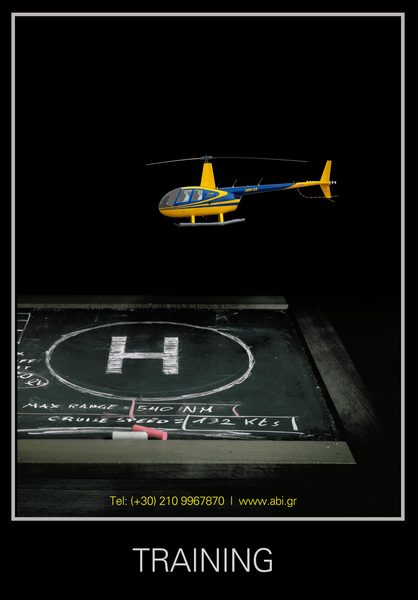Flight Training
ABI features an executive flight training program to organize the flight training you seek. We work with individuals and groups. We offer airplane and helicopter training and training for private or commercial licenses. Whether you are a beginner or experienced, we can provide the right training for you. All of our partners are fully accredited and have reached the requirements sought by the European community including the Joint Aviation Authority and the European Aviation Safety Agency. This guarantees that the most modern European training methodology and systems, highly experienced instructors and the best training aircrafts are at your disposal. Another advantage to flight training in Greece is the excellent Mediterranean weather which provides ideal conditions for all year-round training courses.

READ MORE
Flight Training FAQ 1. Do I need any prior flying experience? No. Most students do not have any prior experience at the beginning of airplane or helicopter training. 2. What are the steps to getting started? First, we recommend that you take an introductory flight lesson. Next, buy the study materials you need to learn more then we recommend that you book an aviation medical exam. 3. What is an introductory flight? An introductory flight will give you the chance to pilot an airplane or helicopter for the first time. This will help you decide if you really want to pursue a pilot’s license. The introductory flight will also give you a knowledge base for lessons you’ll be taking in the classroom. A 30 minute flight is usually enough time. With proper guidance from a flight instructor you’ll be able to discover the magic of flight for the very first time. 4. What are the study materials? The study package contains books, maps, a flight computer and much more to help you understand and obtain the required knowledge to pass all the written exams. In case you wish to become a commercial pilot, you will receive a training DVD. All classroom and homework materials are produced using state-of–the-art software. You can also submit your training and test results online. This method is the most modern and proven method of ground training around the world. 5. What is an aviation medical exam? The Hellenic Civil Aviation Authority (HCAA) requires pilots to have regular medical checkups. These are simple physical exams that are performed by a general practitioner doctor certified by the HCAA as an aeromedical examiner. For the initial issuance of a medical certificate you shall visit a certified aeromedical examination center and by the end of the examination you will get the certificate. The renewal of the certificate is done by certified aeromedical examiners every 12 to 60 months. The time period depends on the age of the pilot and the certificate’s class which is issued according to the type of the license (private, commercial etc.)
6. Do I need perfect eyesight?
No. You only need vision that is correctable with glasses or contact lenses. 7. What do I have to do to register for the school? Contact us and we will guide you through the whole registration process. We will decide together what method or training option is best for you. The next step would be to take a pre-entry test. After that you will complete a registration form and we will begin a training record for you. That’s all! 8. What type of aircraft will I be able to fly after I get my license? Earning an airplane pilot’s license means you will be able to fly a single engine piston airplane below 5.700 kilograms maximum take-off weight. You can also earn the multi engine class rating and fly light twins below 5.700 kilograms maximum take-off weight. We offer helicopter training for the Robinson R22 for which you can get the Robinson R44 type rating. We also offer helicopter training for other types of helicopters such as the EC120 Colibri as well as other types upon request. With ABI, you can receive training for any type of helicopter or airplane type rating.
9. Do I have to get my private pilot’s license before the commercial?
No. There are some benefits to getting a private pilot’s license first, but most people take the simpler and cheapest approach and obtain their commercial pilot’s license right away. In either case we can provide both modular and integrated training. 10. If I already have a fixed wing license or a helicopter license does this help? There is a small credit given to a pilot that already has a license so that reduces the price a little bit, yes. 11. How old do I have to be to get a pilot’s license? You can start your private pilot’s license training at the age of 16. Commercial pilot’s license training can begin at the age of 17 and you can obtain the license at the age of 18. 12. Am I too old to become an employable commercial pilot? The short answer is absolutely not. Many companies prefer to entrust an aircraft to a pilot with some life experience. Airlines usually have an age limit as far as hiring first officers with no prior experience but that is usually the age of 34 years old. There are many options. You can work for a small airline and work your way through a big airline as a captain. You can also work as a flight instructor until you have more experience and a better CV. 13. Am I too heavy to train with you? The Cessna 172 can easily hold someone close to 330 pounds (150 kilograms). The R22 has a seat limit of 240 pounds (109 kilograms) and the R44 a limit of 300 pounds (136 kilograms). 14. How long does the training take to complete? The private pilot’s license can be obtained in less than six months. The commercial pilot’s license can be obtained within one year.
15. Can I work at my job and train at the same time?
Yes. We understand that a lot of people must work to pay for their training. That is why we can offer a distance learning option for ground training lessons. You can then customize your flight training schedule around your work schedule. 16. What time is the school open? School is open every day from 8 a.m. until sunset, seven days a week! 17. When does the school semester begin? There is no fixed school start date because every student is trained individually. The only thing that is fixed is the ground training schedule also known as ground school. Ground school starts twice a year in March and September, should you wish to follow the integrated course. In any other case, the distance learning ground training can begin tomorrow! 18. Do you require the full tuition up front? No. Unlike most flight schools you have the option to either pay in three equal deposits or in smaller deposits. Your account will be debited every time you fly and the only thing that is not allowed is to fly with insufficient balance for the flight in your account. We aim to be as flexible as possible. 19. What is the best way to fund my flight training? One option is to apply for a student loan from your bank. Our school does not interfere with student financials, but we can help you try and find a way to fund your training. 20. Are accommodations available? Yes. We provide beautiful rooms that are just 50 meters away from the sea and just eight minutes away from the airport in a beautiful area of Athens. Supermarkets, banks and a postal office are quite near to the accommodation. We also provide free transportation to and from the airport using our corporate mini-van. The city center of Athens is just 25 minutes away by train or car. 21. Does the flight training school hire its students as pilots? Absolutely! Many students started their career as flight instructors or co-pilots with us. This is a great opportunity that can be given to “low-time” talented pilots seeking to work in a professional environment. Students gain great experience being involved in all types of exciting aerial operations. 22. Is there a limit to how many students can train in the school at one time? No. We currently operate enough aircraft to fit our students’ needs and our fleet keeps growing. We also have ample flight instructors. The only limit we always set for training quality purposes is that no more than eight students will be in the same classroom for ground instruction. So in that case the ground training can be made in shifts to ensure that a logical number of students will attend a course each time.



